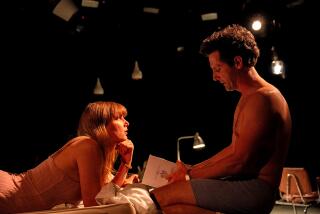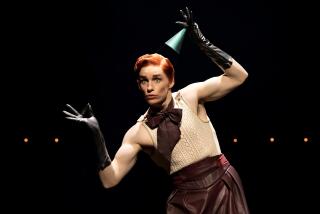Now on DVD: two pieces of 1940s Iowa heaven
I couldn’t say from personal experience what America was like during World War II, but I like to think it looked like Iowa. Not the Iowa of Grant Wood, with its ominously verdant hills and dark, swooping farm roads. Rather, the Iowa of 1940s movie musicals, a storybook Middle America where every picket-fence gate opened into a three-story cocoon of neo-Colonial furniture and every street led to a soda fountain at the town center.
This was the Iowa glimpsed in two breezily entertaining examples of the genre just out on DVD: “Orchestra Wives,” which premiered the first summer our soldiers spent in Europe, and “State Fair,” which was released upon their first summer back. Wholesome and solid, this Iowa was a place worth fighting for, and a place worth returning to.
In the timeline of movie musicals, the Hawkeye State provided the perfect midway point for a decade that was neither here (as in the ersatz Manhattan of Busby Berkeley, Fred Astaire and Ginger Rogers in the ‘30s) nor there (as in the ersatz Hollywood of “Singin’ in the Rain” and “A Star Is Born” in the ‘50s).
On the face of it, however, Iowa seemed an improbable nerve center for a musical decade that, notwithstanding the provincial slumming of Judy Garland (e.g. “Meet Me in St. Louis”), was distinguished primarily by the urbane nightclub tuners of 20th Century Fox: eye-popping, thinly plotted affairs that anchored the restless hips of Betty Grable and Carmen Miranda behind a microphone.
As in so many musical romances that contrived to marry urban and rural sensibilities, “Orchestra Wives” and “State Fair” opined that country bumpkins harbored secret lusts that could be fulfilled only by those wild cats from the big city.
In the talky but rhythmically vivacious “Orchestra Wives,” fresh-faced “Andy Hardy” veteran Ann Rutherford is a country doctor’s daughter who resists the overtures of the local soda jerk in favor of a suave New York band trumpeter (George Montgomery). In “State Fair,” an Iowa farm teen (Jeanne Crain) throws over her milquetoast boyfriend for the metropolitan charms of a journalist (Dana Andrews).
“Orchestra Wives” is the lesser appreciated, but it exudes the sleek professionalism of its veteran creative team. The director was Archie Mayo, a former actor who earned his filmmaking stripes from ‘30s melodramas “The Petrified Forest” and “Bordertown.” Lucien Ballard, known for his indelible color cinematography in “The Wild Bunch,” did the vibrant black-and-white camera work. The screenplay, in which Rutherford loses her naivete amid a viper’s nest of musicians’ wives, was written by Karl Tunberg, whose famously doctored script for “Ben-Hur” would be the lone loser among that film’s 12 Oscar nominations.
It’s the vintage Glenn Miller musicianship that justifies the $14.98 price tag, however. The Iowa-born band-leader, playing a fictionalized variant of himself, spotlights his peerless musicians in such sultry Harry Warren-Mack Gordon classics as “Serenade in Blue” and “At Last.”
The piece de resistance is saved for last, the irresistibly toe-tapping “I’ve Got a Gal in Kalamazoo” (sax-player-singer Tex Beneke harmonizing with Miller’s Modernaires and Betty Hutton’s spitting-image sister, Marion). Just when you think you’ve hit Cloud 9, the dance-sensational Nicholas Brothers team expands the number in a leg-splitting encore that sends you floating up to 10.
There is nothing in the 1945 “State Fair” (which comes in a two-disc set with the inferior 1962 remake) that quite matches this for sheer, unfettered exuberance. That said, there isn’t a dud in the entire Rodgers & Hammerstein score, which includes the Oscar-winning “It Might as Well Be Spring” and the carousel-waltzing “It’s a Grand Night for Singing.”
Given their only opportunity to collaborate for the screen, it’s perhaps ironic that the composing team that pioneered the integration of song and libretto in “Oklahoma!” should come up with what is essentially a ‘40s nightclub musical in gingham-tablecloth disguise. At least two of the numbers are sung in front of mikes without any particular motivation, and two of the stars (Vivian Blaine and Dick Haymes) display their big-band pedigree in spades.
One might have wished that the DVD special features had been able to include a sampling of Dana Andrews’ actual singing voice (he was dubbed, along with Jeanne Crain). No one knew Andrews was operatically trained when a vocal stand-in was hired, and Andrews purportedly went along because he figured the guy needed the job.
More to Read
The biggest entertainment stories
Get our big stories about Hollywood, film, television, music, arts, culture and more right in your inbox as soon as they publish.
You may occasionally receive promotional content from the Los Angeles Times.










